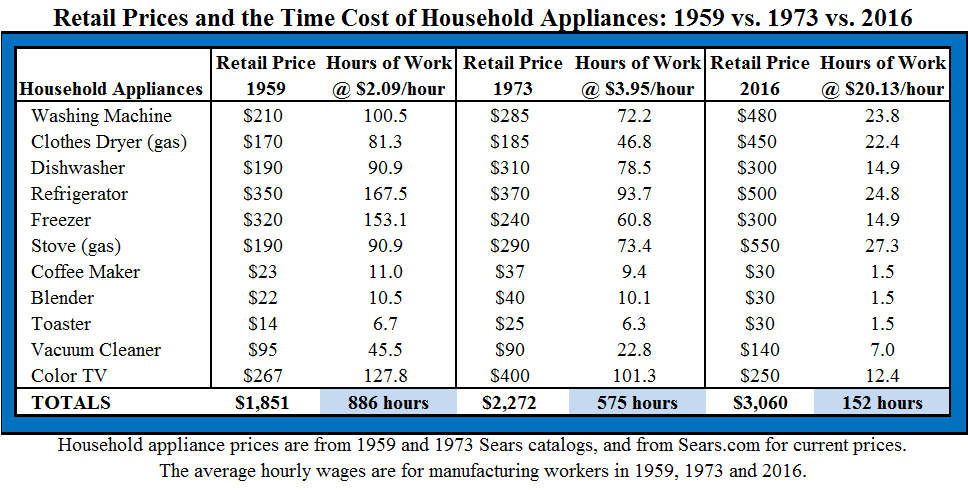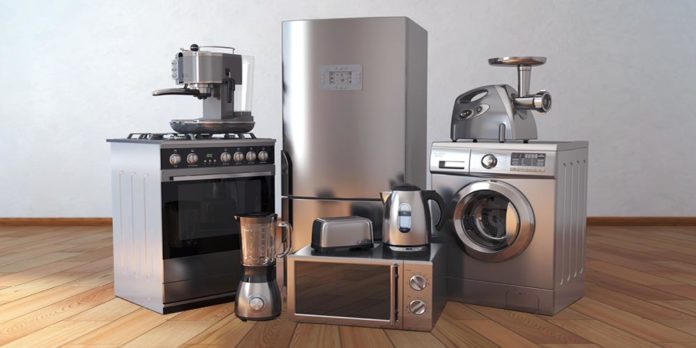My wife and I bought our house in 2013. Our refrigerator and dish washer were both made by (or at least branded by) Montgomery Wards, which went out of business decades ago. There has not been a Montgomery Wards near where we live since the late 1980s, meaning that the refrigerator and dish washer in our home were at least 25 years old when we moved in. It is far more likely that these were the original dishwasher, and refrigerator, from when our house was built in 1978, making these appliances 35 years old, at the time we moved in. Our house also had the original furnace, and original air conditioner, when we moved in.
We have since replaced our dishwasher twice, and have replaced our furnace, air conditioner, and refrigerator. Our refrigerator needs to be replaced a second time.
One might ask why a Montgomery Wards dish washer lasted more than 35 years, when a Bosch (the first brand we replaced it with) can’t last five. One might ask why a Montgomery Wards refrigerator lasted more than 35 years, when a Samsung (what we replaced it with) can barely go two before the ice maker craps out (Samsung replaced it under warranty), and can’t go four years total before needing to be replaced. If Montgomery Wards made such great appliances, why did they go out of business?
To many young people today, the quality of appliances in the past must sound like something out of an ‘Ancient Aliens’ episode.
The truth is that Montgomery Wards did not make great appliances, and that while Bosch and Samsung may make garbage, that’s not their fault.
I had my car fixed a few months ago, and I was charged $110 per hour for labor. Not all of that went to the mechanic, who probably makes about $50 an hour (the average wage for an auto mechanic, according to Salary.com), but $110 an hour is what I had to pay, which means that for labor, an auto mechanic shop charges $220,000 per year, per mechanic. Appliance repair technicians make about $44 an hour on average – not quite as much as an auto mechanic – but still enough that we pay about $100 an hour to the companies that employ them, for their services.
Cars cost an average of about $35,000, so it makes sense to pay $110 an hour, if necessary, to fix one, but how much sense does it make to pay $100 an hour to fix a refrigerator that only cost $2,000 to buy (we bought a top of the line unit)? The answer is that it makes no sense at all, so as soon as something breaks on a refrigerator, a dish washer, a furnace, an air conditioner, or any other home appliance, if the warranty has expired, we replace them rather than repairing them.
Manufacturers know that we are not going to repair appliances, so they don’t make them to be repaired. Manufacturers also know that appliances are going to break after about five years, on average, so there is not a single part on any appliance in your home that is designed to last more than about five years.
If appliances cost less to repair, we’d repair them. If appliances cost more to manufacture, we’d repair them. Appliances cost very little to replace, and a great deal to repair, so once the warranty expires, home appliances are treated as disposable.

According to Dr. Mark Perry, the average worker had to work 93.7 hours to buy a refrigerator in 1973, and only 24.8 hours to buy a refrigerator in 2016. In 2016, only an idiot would throw more than a couple hundred dollars into repairing a refrigerator, even if they have one of the ones with water, ice, and all of the other niceties, rather than a $500 model, that just keeps food cold.
Against this backdrop, consider that recycling has never been more popular in the United States than it is today. My wife and I fill our recycling bin every week, and usually only have a bag or two in the garbage bin. Does that mean our landfills have less in them? Guess where our broken appliances go… We may not be filling our landfills with aluminum foil as much as we used to, but we are putting televisions, computers, refrigerators, and all of our other disposable appliances into landfills.
The enviro-Nazis out there, who support the Green New Deal, might suggest that the ‘solution’ to a society in which we replace, rather than repair, appliances, is to make appliances far more expensive to replace, but I have another solution: do nothing.
Appliances are incredibly feature-rich, and the features in them are constantly improving, making existing appliances largely obsolete within a few years. Against that backdrop, with the ridiculously low price of appliances, it makes sense to replace them every few years, even if they are not broken. Furthermore, the high cost of labor in the United States has driven much of the appliance manufacturing overseas, giving us cheaper appliances, while simultaneously improving the lives of people in other countries, such as China. The fact that it makes more sense to replace an appliance, rather than to repair one, is based solely on the fact that our nation is already wealthy, whereas other nations are still becoming wealthy. As the rest of the world starts to catch up to us in wealth, and the cost of labor in developing nations begins to catch up to the cost of labor here, repairing appliances will start to make more sense again. In the meantime, we should enjoy having cheap appliances.
Moreover, most of the pollution on Earth comes from very poor countries. With plastics, for example, the majority of the Earth’s pollution comes from but five poor countries. Caring about the environment is a luxury people in poor countries do not have, so the best way to improve the environment is to continue letting wages, and living conditions, in those countries improve.
Conditions in the poorest countries are improving at a remarkable pace, thanks to the very free-market mechanics so many in wealthier nations are turning against. Contrary to popular opinion, we have almost eliminated world poverty, as defined by the UN. Government largess is not responsible for the astounding reductions in world poverty, but rather, free market dynamics are. We move our manufacturing to countries with cheap labor, and the cost of labor in those countries goes up, improving the lives of the people who live there. Socialists often call this process ‘exploitation,’ but to the billions of people who can eat, and who were starving before, free markets are the opposite of ‘exploitation’.
One of the truly strange things about the political left, is that they often seem to believe the exact opposite of what is true. Just as today’s left says the world is on the verge of mass-starvation, when in reality, world poverty is almost gone, so too Alexandria Ocasio-Cortez recently lamented about how we have brought up a whole generation of people who have never seen American prosperity. The truth is that the generation she speaks of has never seen anything BUT prosperity, and as a consequence, has nothing to compare prosperity to. People complaining on Facebook about how poorly they have it, on $1,000 smart phones, while watching cable TV on 82-inch flat screen televisions, in air-conditioned homes – that’s the American youth of today.
To many on the left today, the ‘solution’ to a world in which low energy costs are rapidly making everyone wealthy, is to ‘invest’ in energy sources that will make energy prohibitively expensive. Once those same people realize that the high cost of labor has also all but ended the home appliance repair industry, their solution may well be to make home appliances radically more expensive again.
Some people never learn…
























